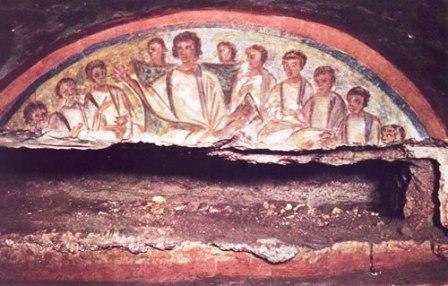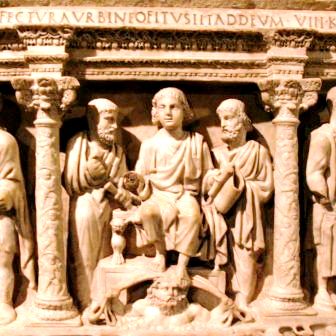 Today we will compare the Oratio super populum from the Ordinary Form and the Extraordinary Form.
Today we will compare the Oratio super populum from the Ordinary Form and the Extraordinary Form.
A great new feature of the 2002 Missale Romanum in Latin is that for Lent the "Prayer over the people" or Oratio super populum has been revived as an option.
Priests can use this prayer NOW at the end of Mass, but still only in the Latin.
Let’s have a look at today’s:
ORATIO SUPER POPUUM (2002MR):
Tueatur, quaesumus, Domine,
dextera tua populum deprecantem.
et purificatum dignanter erudiat,
ut consolatione praesenti ad futura bona proficiat.
This prayer was in the Liber sacramentorum Augustodunensis, et alibi, in which it was the Super populum for Monday of the 4th Week of Lent when the Station is at Four Crowned Martyrs. As you can see if you check your missals, the Super populum for that day changed in the Tridentine reform. It was already changed by the time of the Missalis Romani editio princeps from Milan in 1474. The prayer was, in the post-Tridentine Missale Romanum, moved to the Super populum of Saturday in Passion Week.
 You see… in centuries past prayers were moved around too.
You see… in centuries past prayers were moved around too.
SLAVISHLY LITERAL VERSION:
May Your right hand, O Lord,
defend Your pleading People,
and worthily instruct it (they/us), once purified,
so that by present consolation it (they/us) may attain to good things to come.
This prayer presents to my mind the image of God either as Father or perhaps better as Teacher.
In the ancient world, children were given over for instruction to the paedagogus. Instruction, as Augustine and others describe, was accompanied by plenty of beatings. Perhaps then children might turn to mother for consolation, or some other house servants (famuli). Consider that tension between "purify" and "instruct", with the promise of rewards down the line with consolation.
Ancient depictions of Christ as Teacher were similar to His depiction as Pantocrator, Almighty, and Him "in Majesty". Christ as Teacher is usually depicted seated, as a magister would be in his teaching chair or cathedra, in philosopher’s garb, with a book or scroll and with a hand raised in a teaching gesture. Often He is surrounded by Apostles, who also make gestures of apprehension and approval.
Christ is the great Teacher. He teaches us outwardly, through his words and deeds in the Gospels, as well as inwardly though more subtle means. Augustine commonly presented Christ as "inner teacher". Christ is also the "Wisdom of God". Within us all is the presence of the Word, Logos, which guides the mind. Christ guides us particularly in his self-emptying, His lowliness.
Nevertheless, the Teacher will apply correction to our lives.
Let’s jump now to the corresponding prayer in the Extraordinary Form today and see if there is any difference in style.
In the abovementioned Liber sacramentorum Augusttodunensis this prayer was Collect, it seems, during Advent. A variation begins, Excita Domine quaesumus potentiam tuam et veni ut… If anyone doubted whether Advent was a penitential season, just look at the prayers of our forebears.
That said, those Advent versions were somewhat abbreviated compared to our prayer today. I did find the longer version with the ablative absolutes in the final part, but beginning Excita, in various codices but none of them a ancient as the LsA. For those who care to see more, here is a detail from the page which is one of my sources, the CCL series.
Fascinating, I am sure.
ORATIO SUPER POPUUM (1962MR):
Subveniat nobis, Domine, misericordia tua:
ut ab imminentibus peccatorum nostrorum periculis,
te mereamur protegente eripi,
te liberante salvari.
LITERAL VERSION:
In Your mercy, O Lord, come to our aid:
so that in the imminent dangers of our sins,
you protecting us we may merit to be saved,
you freeing us we may be saved.
After reading the Latin and my versions of the Super populum prayers in the 2002MR over the last weeks, you can hear immediately a very different tone in this version from the Extraordinary Form.
And this is typical of the changes made to and choice of the prayers for the post-Conciliar Missale Romanum.
The older prayers will not shy from addressing our sinful nature and the fearful judgment we face.
The newer prayers tend to stress less the guilt of sin and our need for mercy and need for His intervention. They focus rather on the fulfillment of God’s mercy and His intervention obtained.


































Father Z,
Excellent comparison of the EF & OF prayers!
In the Ecclesia Dei “Red Missal” for the EF Liturgy, on page 60 it lists the “Sins Against the Holy Spirit”. Q: Can you guess which one is listed first? A: “Presumption of God’s Mercy”.
I’ll leave it to your blog readers to ascertain which of the above “Oratio super populum” prayers trends more dangerously in that direction of presumption….
From what I have seen myself in comparing the EF & OF prayers, that dangerous trend is not an isolated incident either – which you have commented upon before Fr. Z, and which Dr. Lauren Pristas has commented upon also. For more details, especially wrt Dr. Pristas’ perspectives, go here:
https://wdtprs.com/2010/02/the-consilium-revisited/#comment-187371
Pax et benedictiones tibi, per Christum Dominum nostrum,
Steve B
Plano, TX
Does this situation change any with the new translations?
On the other hand, today’s OF collect provides a most unusual instance in which the ICEL translation emphasizes sin and evil more than the Latin original!
Original Latin
Ecclesiam tuam, Domine, miseratio continuata mundet et muniat, et, quia sine te non potest salva consistere, tuo simper munere gubernetur.
Literal translation
O Lord, may Your constant mercy cleanse and strengthen Your Church, and, since she cannot be saved without You, may she always be governed by Your bounty.
ICEL translation
God of mercy, free your Church from sin and protect it from evil. Guide us, for we cannot be saved without you.
Yatzer: I think Father Z’s contrast is between the EF and OF Latin originals. So even if the new English translation is more accurate, this contrast should remain (whereas the old English translation generally made the discrepancy even greater).
Von Balthasar wrote in numerous places that “this love (the total self-emptying of Christ) demands the complete gift of our life in return. Nothing short of that will do.” This seems reminiscent of Jesus’ words after the Beatitudes, “unless your righteousness exceeds that of the scribes and Pharisees you will not enter the kingdom of God.” In other words our actions and thoughts, motivations, need to be marked by generosity and measured against it. If we are applying this measure to our life we can in a sense presume that God will be merciful. To presume UPON God’s mercy while leading a willful life of sin is another matter. Judgment day will come hard for every person because we have all offended God and stand deserving of hell. But if we are receptive after the example of Our Lady, and allow God to reveal the image of his divine Son on our soul, therein lies our hope. If we carry our “sarcina” with a measure of trusting acceptance, generosity, making use of the means for our salvation, then we are assured God’s mercy toward our shortcomings. What else does serving God involve other than avoiding evil, keeping his commandments, and being occupied with the things of God as best we can? Does a prayer calling upon the help of the Lord need to express the most profound contrition, or is it enough to acknowledge our need of his support to sustain our life? After all, our sins are forgiven (in a general sense notwithstanding the need to confess them) to the extent that we forgive others. I believe God watches over the affairs of those who truly love him without their worrying about them. If suffering is to be a part of our training it is part of God’s passive will and not a punishment–rather a result of the Fall. In the Pantocrator, the right hand is raised to represent the authority of Christ as teacher. But does he not lead us first by his virtues? And those whose lives are marked by the virtues of Christ, did Christ tell them to fear judgement, or did he say they were blessed? Blessed are they that suffer persecution for justice’ sake: for theirs is the kingdom of heaven. “for justice’ sake” – for the sake of the Just One and with the Just One who suffers with us. I do not believe that the Novus Ordo pryers are marked by an unhealthy presumption. At least not in a way that’s “dangerous.”
This is the way the Prayer over the people is worded in my New Marian Missal(1962):
Let Thy mercy, O Lord, come to our help: that by Thy protection we may deserve to be delivered from the dangers hanging over us for our sins and by Thy deliverence to be saved.
Thanks, Fr.Z. for your commentary on the prayer over the people in both forms.
I am so grateful the new Missal in the OF has reinstated this (unfortunately only in the Latin edition; we pray this here when we have the OF; at a local parish where I help out, the English missal still doesn’t have it…I do miss it). We need these blessings during Lent when the spiritual battle gets into fever pitch!
St. Jospeh Daily Missal (1962) prayer over the people:
Defend Us, O Lord, by Your protection and always keep us from all wickedness.